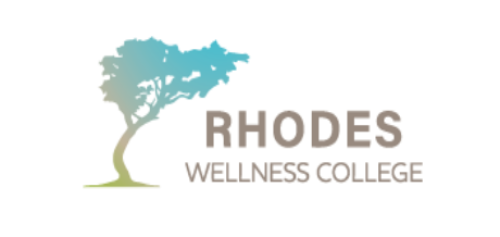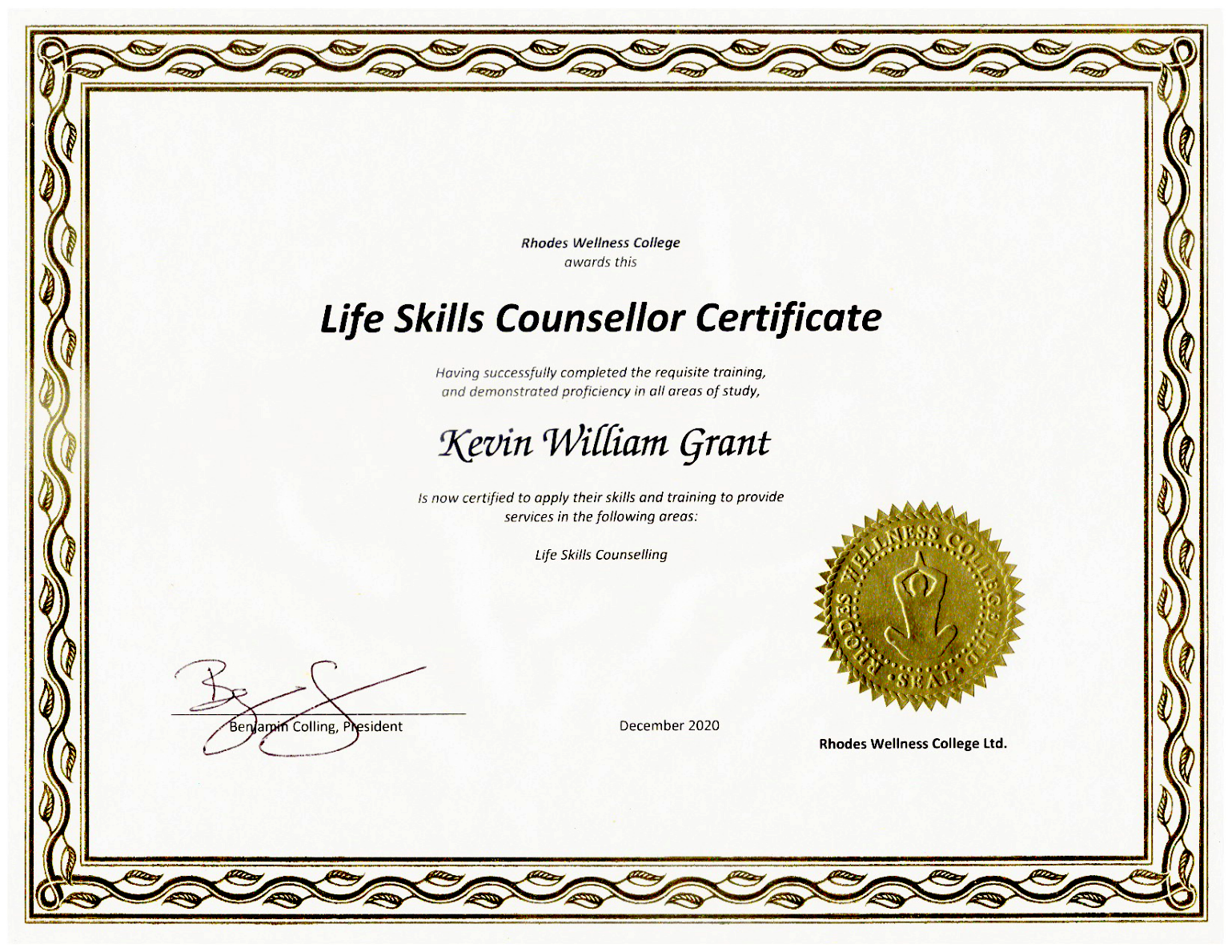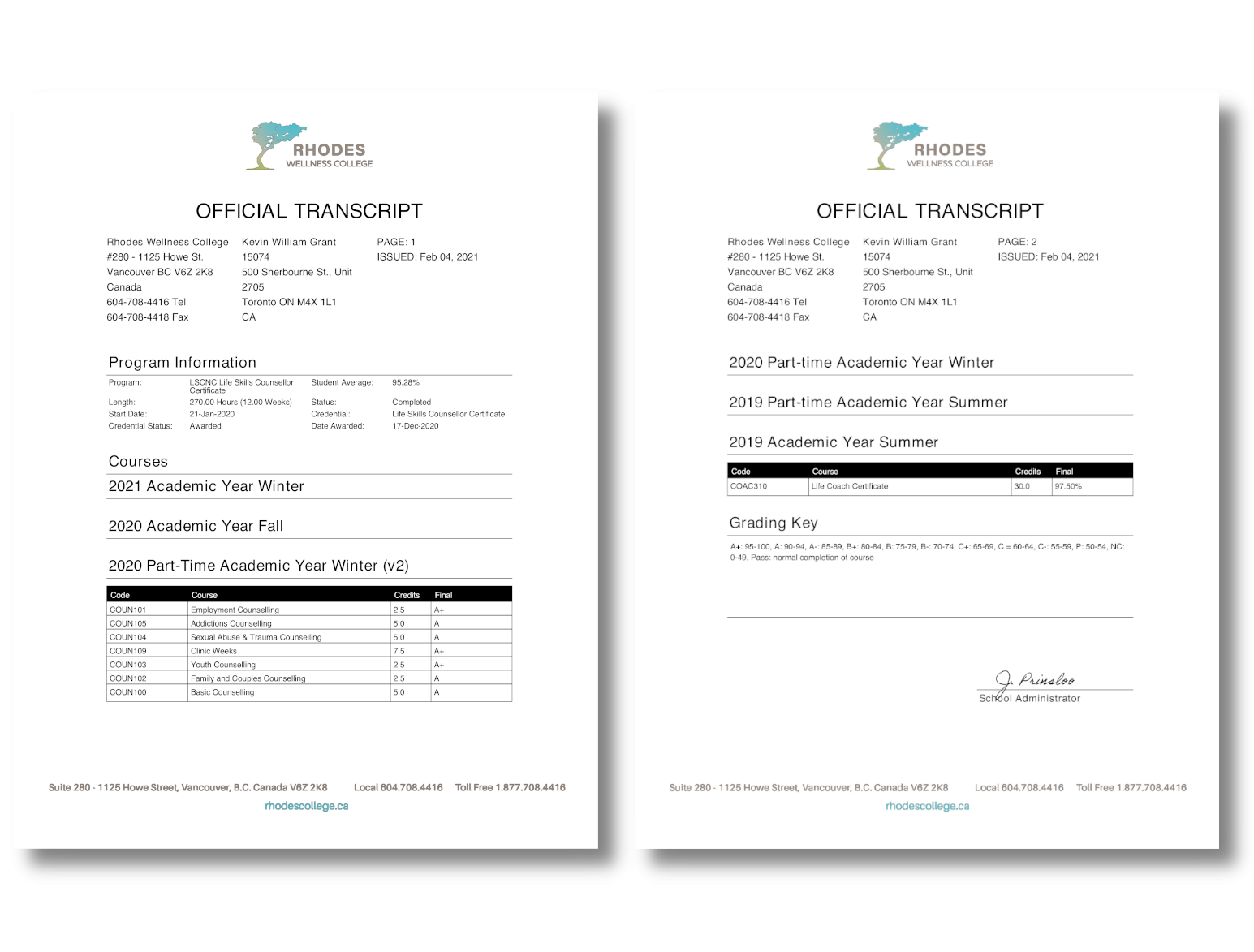
Rhodes Wellness College
2020
This comprehensive program is designed to train life skills counsellors in a variety of counselling skills and techniques. Upon completion, students will be able to provide basic counselling, assessment and intervention to a variety of individuals.
This program provides students intending to enter the helping professions with knowledge of theory and practice skills related to client problem management and opportunity development.
Through a structured professional curriculum divided into academic and experiential components, students will be able to demonstrate a wide range of counselling theories and skills. This program stresses the importance of the student’s personal development as a counsellor and provides opportunities for assessment of clinical abilities. Students will be able to self-monitor their own progress.
Upon completion, students will be qualified to provide basic counselling, assessment and referral in the following areas: Basic Counselling, Addictions Counselling, Sexual Abuse and Trauma Counselling, Family and Couples Counselling, Youth Counselling, and Employment Counselling.
In addition, students will acquire the skills necessary to conduct intake interviews, maintain case files and session notes.
Program Description
This comprehensive program is designed to train life skills counsellors in a variety of counselling skills and techniques. Upon completion, students will be able to provide basic counselling, assessment and intervention to a variety of individuals.
The program is a total of 45 weeks with 390 hours of instruction.
Program Learning Objectives
This program provides students intending to enter the helping professions with knowledge of theory and practice skills related to client problem management and opportunity development.
Through a structured professional curriculum divided into academic and experiential components, students will be able to demonstrate a wide range of counselling theories and skills. This program stresses the importance of the student’s personal development as a counsellor and provides opportunities for assessment of clinical abilities. Students will be able to self-monitor their own progress.
Upon completion, students will be qualified to provide basic counselling, assessment and referral in the following areas: Basic Counselling, Addictions Counselling, Sexual Abuse and Trauma Counselling, Family and Couples Counselling, Youth Counselling, and Employment Counselling.
In addition, students will acquire the skills necessary to conduct intake interviews, maintain case files and session notes.
Clinic weeks provide additional opportunities to practice counselling skills under supervision, investigate case studies, conduct research and read course reference materials.
Upon certification, students will have conducted a minimum of 30 client counselling hours.
Program Learning Objectives
This program provides students intending to enter the helping professions with knowledge of theory and practice skills related to client problem management and opportunity development.
Through a structured professional curriculum divided into academic and experiential components, students will be able to demonstrate a wide range of counselling theories and skills. This program stresses the importance of the student’s personal development as a counsellor and provides opportunities for assessment of clinical abilities. Students will be able to self-monitor their own progress.
Upon completion, students will be qualified to provide basic counselling, assessment and referral in the following areas: Basic Counselling, Addictions Counselling, Sexual Abuse and Trauma Counselling, Family and Couples Counselling, Youth Counselling, and Employment Counselling.
In addition, students will acquire the skills necessary to conduct intake interviews, maintain case files and session notes.
Clinic weeks provide additional opportunities to practice counselling skills under supervision, investigate case studies, conduct research and read course reference materials.
Upon certification, students will have conducted a minimum of 30 client counselling hours.
Program Format
This program includes a variety of teaching methods that coincide with students’ various learning styles and the skills required for employment in the helping professions. The training is conducted in a “circle” to maximize input from students. In addition, class size is small in order to provide students with individual feedback and attention. Specific instructional methods include the following:
1. Lectures and Role plays
2. Instructor demonstrations
3. Writings and Readings
4. Group discussions
5. Consultation sessions with the
instructor(s).
COUN 100 Basic Counselling
This introductory course is a prerequisite for all students in the counselling program. In this course, we examine the knowledge and skills needed to provide individual counselling, including interviewing, assessment, and referral. This course combines theory and skill practice. Course content is built on humanistic theory developed by Carl Rogers. This course is open to anyone in the helping professions - staff or volunteer. Each participant is required to demonstrate competency in empathizing, responding and assessing needs.
COUN 101 Employment Counselling
This course presents introductory theory and practice of employment counselling. Participants will examine how to counsel individuals to make informed career choices. Participants are guided through a series of exercises designed to help clients with individual assessments, career exploration, and development as well as setting short and long term employment goals. Job placement and monitoring strategies are provided.
COUN 102 Family & Couples Counselling
Participants learn how to assess family systems and define problematic couple and family dynamics. This course emphasizes and identifies techniques in the application of systemic/ structural and narrative approaches to family and couples therapy and develops an awareness of the verbal and nonverbal messages that tend to dominate patterns of interaction. The course provides skill development opportunities for learning a variety of assessment and intervention techniques.
COUN 103 Youth Counselling
This course focuses on the fundamentals of normal development related to children and youth. Family issues, peer culture, puberty, respect and responsibility, drug and alcohol issues and high risk behaviour and aggression are considered. The importance of developing rapport, mutual trust and respect when working with young clients is highlighted throughout the course. Students will be provided with the tools necessary to assist youth to navigate the problematic path leading to adulthood and therefore assisting them to become healthy, productive and contributing participants in the community.
COUN 104 Sexual Abuse & Trauma Counselling
This course focuses on the effect of sexual abuse and other psychological traumas on individuals, families and communities. It will further provide an understanding of the different types of offenders and factors which may have facilitated the individual becoming an offender. Participants will understand the nature of post- traumatic stress and assist clients to begin their recovery. Traumatic events such as sexual assault, child sexual abuse, residential school effect, domestic violence, and critical incidents will be examined. Students learn specific skills including assessment and referral procedures when working with survivors and their families.
COUN 105 Addictions Counselling
This course provides students with the skills necessary to identify the addictive process and to counsel clients in various stages of the process of change. The many forms of addictions are examined and the skills needed to assist clients will be demonstrated and practiced. The focus of the course is the development of a thorough understanding of the Stages of Change Model. The course provides information on the effects of use and abuse of psychoactive drugs in the human body including information on basic pharmacology. Self-regulation theory, eduction of enabling behavior, and the appropriate/ responsible use of intervention strategies will be examined.
COUN 109 Clinical Practice Skills Practice & Practice Sessions
Clinic weeks provide additional opportunities to practice counselling skills under supervision, investigate case studies, conduct research and read course reference materials. Upon certification, students will have conducted a minimum of 30 client counselling hours.
-
Not Available
-
1-877-708-4416
-
www.rhodescollege.ca

